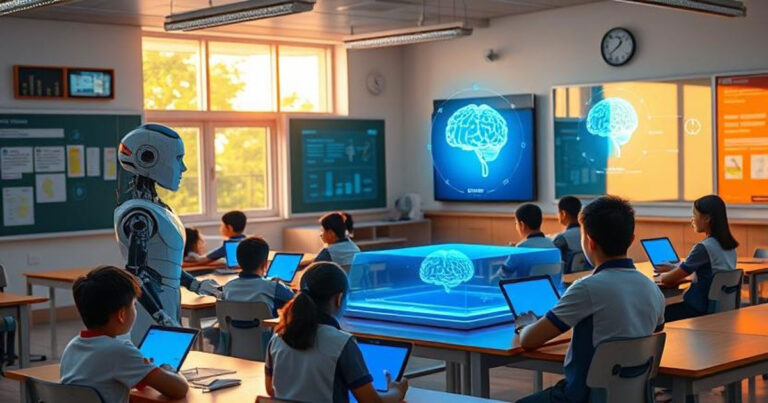In the fast-evolving world of technology, Artificial Intelligence (AI) has emerged as one of the most powerful forces reshaping every aspect of human life—including education. As we step into 2025, AI is no longer just a futuristic idea. It is actively transforming how we teach, learn, and interact within the academic world.
AI in education is enabling personalized learning experiences, intelligent content creation, automated assessment systems, and data-driven insights for educators. From helping students with disabilities to providing real-time feedback, AI is creating a more inclusive, efficient, and intelligent learning environment.
The Human Side of AI in Education
One common concern about AI is whether it will replace human teachers. The answer is no—and that’s a good thing. AI is not here to take over classrooms. It’s here to support, guide, and enhance the way teachers work. Think of AI as an intelligent assistant, allowing educators to focus more on emotional intelligence, creativity, and mentoring—things only humans can do best.
AI analyzes student behavior, learning speed, and preferences to help teachers build custom lesson plans tailored to each learner. With repetitive tasks automated, teachers get more time for one-on-one interactions and building meaningful relationships with students.
This combination of human connection + AI precision is the future of truly impactful education.
What AI in Education Looks Like in 2025
In 2025, AI in education goes far beyond chatbots and grammar correction. Here’s what we’re witnessing:
- AI-powered Learning Platforms: Platforms that adjust the difficulty level and type of content in real-time based on the learner’s progress.
- Smart Assessments: AI creates and evaluates assignments with personalized feedback.
- Language Learning with AI Tutors: Speech recognition and NLP are transforming language learning.
- Assistive Tools for Special Education: AI aids students with dyslexia, autism, and other challenges through voice commands, visual aids, and adaptive content.
- Predictive Analytics: AI helps identify students at risk of falling behind and suggests proactive solutions.
These developments are not just hype—they are happening now, and they are growing at lightning speed.
Why AI Matters for Students and Teachers
For Students:
- Learn at your own pace
- Receive targeted content that suits your strengths and weaknesses
- Get feedback in real time
- Study smarter, not harder
For Teachers:
- Save time on grading and administrative tasks
- Use data-driven insights to tailor teaching
- Focus more on creativity, mentorship, and student engagement
AI doesn’t replace the teacher—it makes the teacher more powerful.
The Future of AI in Education: What’s Next?
Looking forward, AI is set to become even more embedded in education. We will see:
- AI tutors helping students 24/7
- Virtual reality combined with AI for immersive learning experiences
- AI-integrated exams that test critical thinking, not just memorization
As access to these technologies expands, even under-resourced schools and remote learners will benefit. AI will democratize access to high-quality education globally.
Final Thoughts
The integration of AI in education is one of the most promising revolutions of our time. In 2025, we’re not just imagining the future—we’re living it. With the right balance between technology and humanity, AI can elevate learning to a new level.
This is not about replacing teachers. It’s about empowering them.
This is not about making students robotic. It’s about making learning smart, personal, and inspiring.
The classroom of tomorrow is here—powered by AI, driven by passion, and made for everyone.
Frequently Asked Questions
How is AI used in education today?
AI is used to personalize learning, analyze student behavior, automate grading, and provide real-time feedback.
Will AI replace teachers in the future?
No. AI will enhance teachers’ abilities by automating repetitive tasks and providing tools to support student learning more effectively.
What are the benefits of AI in education?
AI makes learning more personalized, efficient, and accessible. It helps teachers focus on creativity and mentoring while assisting students with adaptive content.
Can AI help special-needs students?
Yes. AI tools like voice assistants, visual learning aids, and adaptive content systems are especially beneficial for students with learning disabilities.
What does the future of AI in education look like?
Expect AI tutors, immersive virtual classrooms, and advanced analytics systems that help students and teachers perform better across all learning environments.
